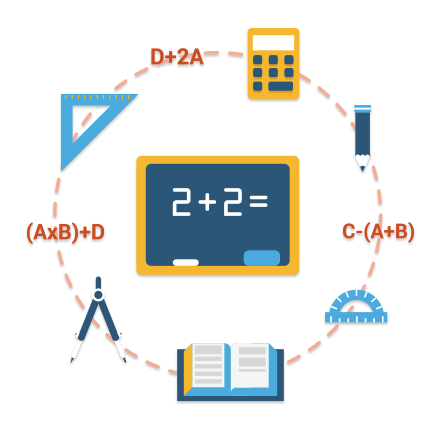Key Stage 5 - KS5 Maths
Key Stage 5 mathematics is the final step on the mathematics ladder for all the keen mathematicians. As it is the final stage of the syllabus, you can expect to cover all topics and areas that you have been taught before as you go through both levels of Key Stage 5; Core Mathematics and Statistics Mathematics. As well as recapping previous stages to a higher level, you will also be taught some new theories and topics such as surds, simultaneous equns and functions. The second level of Key Stage 5 mathematics revolves around statistics, you will be introduced statistical diagrams which include scatter diagrams, stem and leaf plots along with box and whisker plots and cumulative frequency diagrams. In addition to this you will become familiar with statistical probability which involves predicting outcomes based on both previous outcomes as well as new outcomes. If you complete Key Stage 5 mathematics you can call yourself an official mathematician as you will have completed all modules of the maths syllabus, congratulations!
.Popular Maths Curriculum Courses in England.
Key Stage 4
Foundation Maths
Experimental probability, relative frequency, equations involving grouping symbols are some of the areas taught in Foundation Maths.
Key Stage 4
Higher Mathematics
At Higher Mathematics you will be taught surds, surface are formulae and you will also be introduced to circle geometry.
Key Stage 5
Core Mathematics
You will learn algebra-polynomials, polynomial equations, the remainder theorem, absolute value and roots quad equations.
Key Stage 5
Statistics Mathematics
Your studies at this stage will comprise of grouped data, range and dispersion, standard deviation and general statistic probability.



KS5 Topics
#
TOPIC
TITLE
1
Statistics
Scatter Diagrams
Objective: On completion of the lesson the student will be able to construct scatter plots and draw conclusions from these.
2
Statistics
Stem and Leaf Plots along with Box and Whisker Plots
Objective: On completion of the lesson the student will be familiar with vocabulary for statistics including quartiles, mode, median, range and the representation of this information on a Box and Whisker Plot.
3
Statistic-probability
Cumulative frequency
Objective: On completion of the lesson the student will be able to construct cumulative frequency columns, histograms and polygons.
4
Statistics
Frequency histograms and polygons
Objective: On completion of the lesson the student will be able to construct and interpret frequency histograms and polygons.
5
Statistics
The range.
Objective: On completion of the lesson the student will be able to determine the range of data in either raw form or in a frequency distribution table.
6
Statistic-probability
The mode
Objective: On completion of the lesson the student will understand how to find the mode from raw data, a frequency distribution table and polygon.
7
Statistic-probability
The mean
Objective: On completion of the lesson the student will be able to calculate means from raw data and from a frequency table using an fx column.
8
Statistic-probability
The median
Objective: On completion of the lesson the student will be able to determine the median of a set of raw scores
9
Statistic-probability
Calculating the median from a frequency distribution
Objective: On completion of the lesson the student will be able to determine the median from a cumulative frequency polygon.
10
Statistics – grouped data
Calculating mean, mode and median from grouped data
Objective: On completion of the lesson the student will be capable of identifying class centres, get frequency counts and determine the mean and mode values.
| # | TOPIC | TITLE | |
|---|---|---|---|
| 1 | Statistics | Scatter Diagrams | |
| Objective: On completion of the lesson the student will be able to construct scatter plots and draw conclusions from these. | |||
| 2 | Statistics | Stem and Leaf Plots along with Box and Whisker Plots | |
| Objective: On completion of the lesson the student will be familiar with vocabulary for statistics including quartiles, mode, median, range and the representation of this information on a Box and Whisker Plot. | |||
| 3 | Statistic-probability | Cumulative frequency | |
| Objective: On completion of the lesson the student will be able to construct cumulative frequency columns, histograms and polygons. | |||
| 4 | Statistics | Frequency histograms and polygons | |
| Objective: On completion of the lesson the student will be able to construct and interpret frequency histograms and polygons. | |||
| 5 | Statistics | The range. | |
| Objective: On completion of the lesson the student will be able to determine the range of data in either raw form or in a frequency distribution table. | |||
| 6 | Statistic-probability | The mode | |
| Objective: On completion of the lesson the student will understand how to find the mode from raw data, a frequency distribution table and polygon. | |||
| 7 | Statistic-probability | The mean | |
| Objective: On completion of the lesson the student will be able to calculate means from raw data and from a frequency table using an fx column. | |||
| 8 | Statistic-probability | The median | |
| Objective: On completion of the lesson the student will be able to determine the median of a set of raw scores | |||
| 9 | Statistic-probability | Calculating the median from a frequency distribution | |
| Objective: On completion of the lesson the student will be able to determine the median from a cumulative frequency polygon. | |||
| 10 | Statistics – grouped data | Calculating mean, mode and median from grouped data | |
| Objective: On completion of the lesson the student will be capable of identifying class centres, get frequency counts and determine the mean and mode values. | |||
See More Topics Covered in Key Stage 5
..









